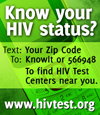Conversations on AIDS.gov with Winston Wilkinson, Office for Civil Rights
Transcript
May 23, 2008
Q: Welcome to Conversations on AIDS.gov, I’m Ira Dreyfuss. Each month on AIDS.gov we have conversations with government officials about HIV/AIDS issues. Today we’ll be talking with Mr. Winston Wilkinson from the director of the Office for Civil Rights in the U.S. Department of Health and Human Services. Mr. Wilkinson, welcome, and thank you for joining us today.
Winston Wilkinson: My pleasure, thank you for having me.
Q: What is the mission of the Office for Civil Rights at HHS?
Winston Wilkinson: We protect the public’s civil rights and health information privacy rights in healthcare and social service programs throughout the United States. We do this by enforcing federal civil rights laws that prohibit discrimination based on race, color, national origin, age, gender, religion, and disability, which includes HIV/AIDS. We also do this by enforcing the HIPAA Privacy Rule which protects the privacy of patients’ health information, including HIV status and medical records maintained by various entities, including doctors’ offices, hospitals, health plans, and healthcare clearinghouses. So we have a critical mission and we take our work very seriously.
Q: What is your role at the Office for Civil Rights?
Winston Wilkinson: I serve at the Department of Health and Human Services’ chief officer for the enforcement of federal civil rights and health information privacy laws. I lead our headquarters office, which sets policy and a national framework for our ten regional offices which, enforce these laws in all fifty states and the U.S. territories.
Q: How does the Office for Civil Rights help people living with HIV/AIDS in the United States?
Winston Wilkinson: We have a highly committed staff and they use our enforcement authorities to protect the rights of people living with HIV/AIDS. We are still seeing instances across the country where doctors, dentists, and nursing home staff refuse to treat patients after learning they have HIV, and that’s unfortunate! This type of behavior is discriminatory and OCR works with providers to secure corrective action and prevent it from happening again. We’ve also seen cases where patients’ HIV statuses are not adequately safeguarded and are wrongfully discussed in front of other patients and non-essential staff. We make sure providers know that this is illegal and that they can be subjected to monetary penalties for violating health information privacy rights.
We know that strong privacy enforcement will help to earn the confidence of people so they’ll know their health information is private, which is likely to result in more people getting tested for HIV, and will promote the sharing of accurate and complete information between patients and their providers.
Q: How does the Office for Civil Rights protect the civil rights and health information privacy rights of people living with HIV/AIDS?
Winston Wilkinson: OCR investigates complaints that we receive from people living with HIV/AIDS alleging that their rights have been violated. When we find a problem, we make sure that the healthcare provider takes corrective action.
For instance, we recently investigated a complaint filed by a man living in Northern California who had HIV. He attempted to get admitted to a local nursing home for post-surgery rehabilitation. And because of his HIV status and young age, a nursing home refused to admit him. OCR intervened and after completing our investigation we required the nursing home chain, which consisted of three facilities in the state, to issue a new non-discrimination policy and, as a result, an additional 200 nursing home beds are now available to people living with HIV/AIDS in Northern California. We’ve had equal success securing corrective action under the HIPAA Privacy Rule.
We recently investigated a complaint filed against a dentist’s office that, as a standard practice, displayed red stickers with the word “AIDS” on the outside of the charts of patients with HIV/AIDS. These stickers wrongfully allowed other patients and staff to see their private medical information. For corrective action, these stickers had to be removed from the outside of the charts and the office had to revise its policies to better safeguard their patients’ health information privacy.
Besides investigating complaints, OCR provides training to healthcare professionals on their legal responsibilities to clients who have HIV/AIDS. We also reach out to people in the community who either have become or are at risk of becoming HIV positive, and work with other agencies and community groups that share our mission.
Q: How can people with HIV/AIDS get assistance from OCR?
Winston Wilkinson: Anyone living with HIV/AIDS who encounters discrimination while seeking healthcare or social services through a state or city agency or a recipient of HHS funds may file a complaint with OCR. Anyone who believes their personal health information or HIV status has been improperly disclosed may also file a complaint with OCR.
Complaint forms can be downloaded from the OCR website at www.HHS.gov/OCR. We investigate complaints that fall within our statutory authority, and if discrimination or Privacy Rule violation is found, we’ll remedy the illegal conduct.
Q: What actions should public health officials take to ensure compliance with the federal civil rights and health information privacy laws that protect people living with HIV/AIDS?
Winston Wilkinson: Public health officials should ensure that people living with HIV/AIDS receive social services and healthcare that is in compliance with HIPAA; that is accessible to persons with disabilities; accessible to people who speak little or no English who may require interpreters; and, finally, officials should be culturally competent in order to address health disparities in treatments and outcomes.
Q: Thank you for speaking with us today about the important work the Office for Civil Rights is doing to help people living with or at risk for HIV/AIDS. To learn more about the Office for Civil Rights visit www.HHS.gov. Please visit AIDS.gov to view the transcript of this podcast. This podcast was created in partnership with the U.S. Department of Health and Human Services Office of HIV/AIDS policy, the managing entity of AIDS.gov.



